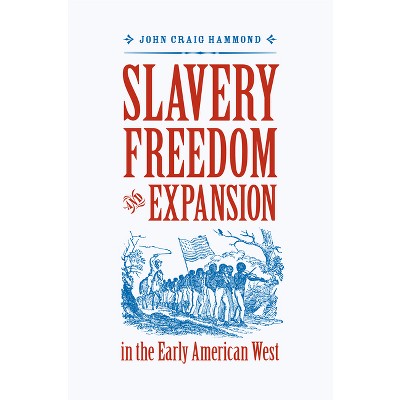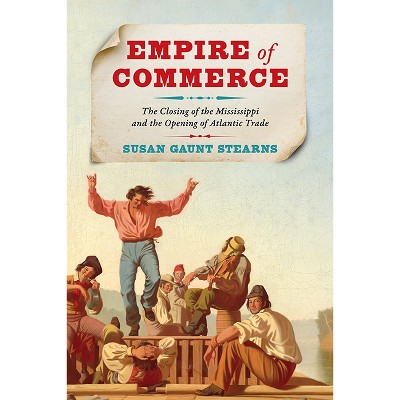Sponsored

Replanting a Slave Society - (Jeffersonian America) by Patrick Luck (Hardcover)
In Stock
Sponsored
About this item
Highlights
- Although it eventually became a regrettably profitable business for enslavers and their partners, a successful slave economy in the American South was no foregone conclusion.
- About the Author: Patrick Luck is Assistant Professor of History at Florida Polytechnic University.
- 256 Pages
- History, United States
- Series Name: Jeffersonian America
Description
About the Book
"This book discusses how new technology led to economic transformation and the rapid expansion of slavery in the lower Mississippi valley after 1800"--Book Synopsis
Although it eventually became a regrettably profitable business for enslavers and their partners, a successful slave economy in the American South was no foregone conclusion. Bringing the lower Mississippi valley to the foreground of the history of the early republic, Replanting a Slave Society is the first major study to analyze in tandem the sugar and cotton revolutions that took place in the region in the years before and after the Louisiana Purchase in 1803. It highlights the far-ranging, at times nation-encompassing, consequences of decisions made by a small elite group of planters and merchants in a remote colonial slave society and their effect on the subsequent course of American history.
In the mid-1790s, the power and prosperity of the lower Mississippi valley's colonial elites came under threat from revolutionary instability and economic collapse. In response, those elites engaged in a successful effort to remake their society by rapidly adopting sugar and cotton production, adapting them to local conditions, taking advantage of, and advancing, the existing slave trades, and reshaping those slave trades to suit their needs. In 1811, following the successful suppression of the German Coast Insurrection (the largest slave revolt in North American history), these planter elites congratulated themselves on the stability and future prosperity of their "replanted" slave society. These crop revolutions marked a key turning point in the history of the lower Mississippi valley and set the economic and social course that the region--the hub of the Deep South--would follow until the American Civil War.
Review Quotes
Luck demonstrates how in a relatively short time [the region] became one of the centers of the 'second slavery' that would power the early nineteenth-century American South and display the features, such as reliance on staple crops and slaveholders' political influence, that would characterize it.--Journal of American History
Thought-provoking, and a nuanced addition to the slavery and capitalism literature, made more impressive by the fact that Luck all but refuses to use the word capitalism anywhere in its pages (despite engaging with the new history of capitalism literature). By analyzing the emergence of cotton and sugar culture alongside each other, Luck brings together two crops that are often viewed on opposite sides of the dividing line of second slavery; and by demonstrating the interconnected and overlapping histories of the international and domestic slave trades, he blurs a traditional boundary used to demarcate first slavery and the supposedly more capitalistic second slavery within an American context. Just as important, he demonstrates that, at least in the lower Mississippi Valley, the slave society was something that had to be constructed, and not the inevitable result of capitalism's unstoppable progression.-- "Journal of the Early Republic"
In a deeply researched and carefully crafted book, Patrick Luck explores neglected transitions, long overlooked by historians, that are essential for understanding precisely how planters, farmers, merchants, and political leaders together shaped the lower Mississippi valley into one of the world's most exploitative and brutal slave societies. And throughout this innovative analysis of technology, marketing, agricultural science, government action, and labor management, he never loses sight of their impact upon the lives of enslaved people.
--Daniel H. Usner, Vanderbilt University, author of Indians, Settlers, and Slaves in a Frontier Exchange Economy: The Lower Mississippi Valley before 1783Luck shows that not all plantation slave societies in the Americas followed the same trajectory; quite the contrary. He also shows how fast the transition was from dying slave society to a society on the make in Louisiana--about a decade by his calculation--all because of planters' speedy adaptation to sugar, cotton, and the internal slave trade.
--Christa Dierksheide, University of Virginia, author of Amelioration and Empire: Progress and Slavery in the Plantation AmericasLuck shows us how a group of enslavers helped actively drive emergent systems of global capitalism in the early nineteenth century, making the conscious choice to adapt themselves to the future, and the future to them. The research is deep. It will become one of the standard works on the emergence of the 'second slavery' in particular regions of the nineteenth-century Atlantic capitalist world.
--Edward E. Baptist, Cornell University, author of The Half Has Never Been Told: Slavery and the Making of American CapitalismAbout the Author
Patrick Luck is Assistant Professor of History at Florida Polytechnic University.











